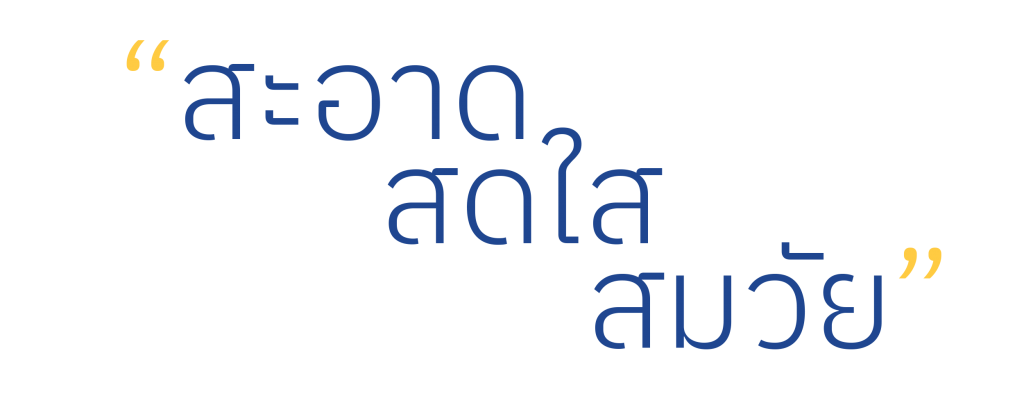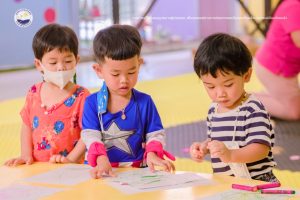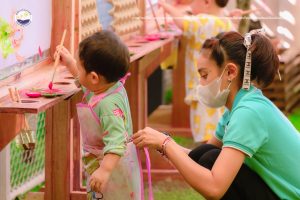
วรพัฒน์เนอสเซอรี่ ได้กำหนดโครงสร้างของหลักสูตรสถานศึกษา ตามมาตรฐานสถานพัฒนาเด็กปฐมวัยแห่งชาติ พุทธศักราช ๒๕๖๑ โดยยึดถือหลักการอบรมเลี้ยงดูและ

ส่งเสริมพัฒนาการและการเรียนรู้ สำหรับเด็กอายุต่ำกว่า ๓ ปี เน้นการจัดประสบการณ์ผ่านการเล่นตามธรรมชาติที่เหมาะสมกับวัย เพื่อการเรียนรู้และพัฒนาอย่างเป็นองค์รวม ทั้งทางด้านร่างกาย อารมณ์ จิตใจ สังคมการสื่อสาร ภาษา สติปัญญา
และวัฒนธรรม โดยจัดกิจกรรมให้สอดคล้องกับความต้องการ ความสนใจ และความสามารถตามวัยของเด็กๆรายบุคคล ทั้งนี้ เด็กในช่วงวัยนี้จะมีพัฒนาการที่เพิ่มขึ้นมากกว่าในช่วงแรกเกิด เด็กมีการพึ่งพาตนเอง แสดงความเป็นตัวของตัวเอง การเรียนรู้ของเด็กๆจะต้องสัมพันธ์กับการพัฒนาทางสมอง ตลอดจนส่งเสริมคุณธรรม จริยธรรม เด็กๆได้รับโอกาสใน
การเลือกทำสิ่งต่างๆ เพื่อให้เกิดการลองถูกผิด กระตุ้นกระบวนการคิดอย่างมีเหตุผลและวิจารณญาณ เพื่อเป็นพื้นฐานการเรียนรู้ในระดับที่สูงขึ้นต่อไป ดังรายละเอียดการพัฒนาทางสมองของเด็กๆดังนี้
Waraphat Nursery has structured its curriculum in alignment with the guidelines set forth by the National Early Childhood Development Center, B.E. 2018. This curriculum is designed to foster and facilitate the comprehensive development and learning of children under 3 years old, emphasizing nurturing and growth. Central to this approach is providing age-appropriate play experiences rooted in nature, aimed at supporting holistic development across physical, emotional, mental, social, communicative, linguistic, intellectual, and cultural domains.
Activities are thoughtfully organized to cater to each child’s unique needs, interests, and capabilities, considering their individual stages of development. During this critical period, children undergo significant developmental milestones, transitioning towards greater autonomy and self-expression. Learning experiences are closely tied to cognitive development while also instilling moral values and ethical behavior.
Moreover, children are encouraged to make choices and engage in trial-and-error activities, fostering logical and critical thinking processes. This approach stimulates cognitive growth and lays a solid foundation for subsequent learning endeavors at more advanced levels.
การพัฒนาทางสมองของเด็กปฐมวัย – ทำไมจึงต้องสอนตามศักยภาพการเรียนรู้ของเด็กรายบุคคล
สิ่งที่เด็กๆรับรู้ สัมผัส ไม่ได้มีผลแค่เพียงทำให้เด็กๆคิดว่าจะตอบสนองอย่างไรเท่านั้น แต่มีผลต่อการสร้างกระบวนการคิด ให้เด็กๆใช้กระบวนการคิดแบบนั้นไปจนโตเป็นผู้ใหญ่ด้วย ประสบการณ์ชีวิตของเด็กในวัยนี้ ทั้งเรื่องราวที่ดี และไม่ดี จะติดเป็นแบบให้เด็กมีความฝังใจ มีความประทับใจ มีความสุข หรือทุกข์อยู่ภายใต้จิตสำนึกของเด็กไปตราบนานเท่านาน
ความคิดของผู้ใหญ่ที่ว่าไม่เป็นไร เด็กๆจำไม่ได้ หรือ ความคิดที่ว่าโตขึ้น เด็กก็รู้เองนั้น ไม่ใช่สิ่งที่ถูกต้อง เพราะเด็กๆเรียนรู้ มีพัฒนาการทางสมอง และสร้างกระบวนการคิดได้มากที่สุดในช่วงประมาณ 3 ขวบปีแรกของชีวิต
กระบวนการรับรู้ของเด็กเริ่มต้นจากการเห็นและได้ยิน ต่อมาก็พัฒนาที่การพูด แล้วตามมาด้วยการสร้างความเฉลียวฉลาด จากความสามารถในการสร้างความมั่นคงทางอารมณ์ สังคม และการสื่อสาร ความสามารถที่สร้างขึ้นได้ในช่วงปฐมวัยนั้นจะเป็นสิ่งที่ทำให้เด็กๆสามารถประสบความสำเร็จในการเรียนรู้และพัฒนาการต่างๆตามวัยในช่วงที่เข้าเรียนในโรงเรียนและอีกหลายปีต่อมาในช่วงชีวิตของตน
Early childhood brain development underscores the importance of tailoring teaching to each child’s learning potential. Experiences in these early years shape immediate responses and long-term cognitive processes. Memories and impressions formed during this period significantly impact lifelong thinking skills, even if not consciously remembered later.
Research highlights the critical role of the first three years in brain development and cognitive processes. Beginning with basic sensory perceptions, children gradually develop language, emotional intelligence, and social skills. These early abilities form the foundation for future learning and success in school and beyond.
Recognizing and nurturing the significance of early childhood experiences is critical to fostering lifelong cognitive development and academic achievement.
เมื่อเด็กๆอยู่ในกระบวนการเรียนรู้ เซลล์สมองจะสร้างการเชื่อมโยงที่ซับซ้อน จนเกิดเป็นร่างแหเครือข่ายเพิ่มมากขึ้นเรื่อยๆ การเชื่อมโยงเป็นเครือข่ายนี้ มีความสำคัญมากกว่าจำนวนเซลล์สมอง สามารถปรับเปลี่ยนรูปแบบได้ตลอดเวลาที่เรามีชีวิตอยู่ ความยืดหยุ่นในการปรับเปลี่ยนนี้เองที่ทำให้สมองมนุษย์สามารถเรียนรู้ได้ตลอดชีวิต
ความยืดหยุ่นของเซลล์สมองของคนมีมากที่สุดในช่วง 1000 วันแรกของชีวิต คือช่วง 0-3 ขวบ นักจิตวิทยาบางท่านนับช่วง 1000 วันแรกของชีวิต ตั้งแต่เริ่มมีการปฏิสนธิเลย พัฒนาการนี้มีความต่อเนื่องไปจนถึงวัยเรียนในระดับประถมศึกษาและระดับที่สูงขึ้นต่อๆไป
Children’s brain cells establish intricate connections during the learning process, gradually forming an expanding network. This network’s connectivity holds more significance than the sheer quantity of brain cells, as it can adapt and change throughout our lives. This flexibility, known as plasticity, enables the human brain to learn across the lifespan.
The plasticity of human brain cells is most pronounced during the initial 1000 days of life, from birth to age three. Psychologists often consider this period from conception a critical development phase. This process continues beyond primary school, extending into adulthood and shaping cognitive abilities and learning capacities.
การสร้างเครือข่ายของเซลล์สมองหรือเซลล์ประสาท เมื่อแรกเกิด มีเซลล์สมองเล็กน้อย มีโครงข่ายโยงใยที่ไม่ซับซ้อน ซึ่งได้พัฒนาการมาในช่วงที่อยู่ในครรภ์ของแม่ ต่อมาในเวลา หนึ่งเดือน ในสมองมีการสร้างเซลล์เพิ่มมากขึ้น ซึ่งเป็นผล จากพันธุกรรมร่วมกับสิ่งแวดล้อม คือการเลี้ยงดูจากพ่อ แม่ และการมีโอกาสได้สัมผัสกับผู้คน ในบ้าน นอกบ้าน หรือสิ่งแวดล้อมตามธรรมชาติต่างๆ เมื่อเจริญเติบโตมาจนถึงช่วง 9 เดือน นั้น สมองของเด็กๆสามารถสร้างเซลล์ประสาทได้ในปริมาณมาก โครงข่ายมีความซับซ้อนมากขึ้น จากการได้ผ่านการเรียนรู้ การปรับตัวต่างๆมา จนกระทั่งถึงช่วงอายุ 2 ปี ปริมาณของเซลล์สมองและโครงข่ายของระบบประสาทมีมากมาย มีการสร้างโครงข่ายที่แข็งแรงซับซ้อน ในช่วงชีวิตของคนเรานั้น มีการสร้างเซลล์สมองหรือเซลล์ประสาท ตลอดจนระบบโครงข่ายของเซลล์สมองที่ซับซ้อน ที่มีพัฒนาการมากถึง กว่า 80% ของการพัฒนาสมองของชีวิตคน ตั้งแต่ในช่วงอายุ 2-3 ขวบ ดังนั้น จึงสามารถเรียกได้ว่าช่วง การเรียนในระดับ เนอสเซอรี่นี้เป็นโอกาสของการเรียนรู้ที่สำคัญที่สุดของชีวิตคนเลยทีเดียว
At birth, the brain starts with a sparse network of neurons, gradually developing during gestation in the mother’s womb. Within the first month after birth, a combination of genetic factors and environmental stimuli, including parental care and exposure to various settings, creates more brain cells. Children’s brains demonstrate significant growth by around nine months of age, generating a wealth of neurons and forming a more intricate network through learning experiences and adjustments.
By age two, the brain boasts many cells and a robust, complex neural network. New brain cells continue to form throughout life, contributing to the ongoing development of intricate neural networks. Notably, over 80% of brain development has occurred by the age of two to three years, marking this period as crucial for learning and development.
Thus, the nursery stage is recognized as one of the most pivotal learning opportunities in a person’s life, providing a foundation for cognitive growth and shaping future intellectual abilities.
เด็กเล็กๆ เริ่มเรียนรู้ที่จะร้องไห้ ยิ้ม หัวเราะ กินอาหาร คลาน นั่ง เดิน พูด และทำกิจกรรมต่างๆ ซึ่งเป็นผลจากการที่สมองรับรู้ เรียนรู้ พัฒนาและเปลี่ยนแปลงตัวเองเพื่อการมีชีวิตรอด ซึ่งเป็นสันชาตญาณของสิ่งมีชีวิตทุกชนิดรวมทั้งคนด้วย
Young children embark on a learning journey as they master fundamental skills such as crying, smiling, laughing, eating, crawling, sitting, walking, talking, and engaging in various activities. These milestones manifest the brain’s innate capacity to know, learn, develop, and adapt to ensure survival—a primal instinct shared by all living beings, including humans.
สมองของคนพัฒนาศักยภาพในการคิด ความจำ ผ่านกระบวนการ ที่เรียกว่า “การเรียนรู้” ซึ่งเกิดขึ้นได้ตลอดเวลา แต่ช่วงเวลาของการเรียนรู้ที่เหมาะสมและเกิดประสิทธิภาพที่สุดนั้น จะเกิดขึ้นได้ตามจังหวะหรือโอกาสที่สอนได้ (teachable moments) เราจึงต้องให้ความสำคัญกับ “พัฒนาการตามช่วงวัย” และโอกาสที่จะสอนเด็กๆให้เกิดการเรียนรู้และพัฒนาการตามศักยภาพของตนเป็นรายบุคคลที่ช่วยการสร้างความทรงจำเพื่อการเรียนรู้ (working memories) ซึ่งจะสะสมเป็นทักษะสมอง (executive functions) ทำให้เด็กๆสร้างเชาว์ปัญญาที่เฉลียวฉลาด รู้จักการแก้ปัญหา ปรับตัวให้เข้ากับการเปลี่ยนแปลงของสิ่งแวดล้อมได้ดี มีความมั่นคงทางอารมณ์ อยู่ในสังคมร่วมกับคนอื่นได้อย่างไม่มีความขัดแย้ง
The human brain continuously develops its capacity for thinking and memory through ongoing learning. However, the most suitable and impactful moments for learning occur during teachable opportunities or “teachable moments.” Therefore, it is crucial to emphasize “age-appropriate development” and provide children with opportunities to learn and grow according to their unique potential. This approach fosters the formation of working memories essential for executive brain functions, enabling children to enhance their intelligence, problem-solving skills, adaptability to environmental changes, emotional stability, and ability to navigate social interactions harmoniously without conflict.
สมองซีกซ้าย ทำหน้าที่โดดเด่นในการเรียนรู้และทำความเข้าใจภาษา เหตุผล รายละเอียด ส่วนสมองซีกขวา ทำหน้าที่โดดเด่นในการเรียนรู้และทำความเข้าใจมิติ ความรู้สึก ภาพรวม สมองทั้งสองซีกทำงานประสานกันแบบองค์รวม ผ่านใยประสาทที่พาดผ่านจากซีกหนึ่งไปยังอีกซีกหนึ่ง เราเรียกกลุ่มใยประสาทนี้ว่า คอร์ปัส แคลโลซัม การผสานการรับรู้และมุมมองของสมองทั้งสองซีก ทำให้เห็นภาพและเข้าใจความหมายของสิ่งต่างๆ ได้อย่างชัดเจนเป็นรูปธรรม
The brain’s left hemisphere excels in tasks involving language comprehension, reasoning, and attention to detail. On the other hand, the right hemisphere specializes in processing dimensions, emotions, and holistic perceptions. Both hemispheres collaborate seamlessly through nerve fibers that connect them, known as the corpus callosum. This integration enables the synthesis of perceptions and perspectives from both sides of the brain, allowing us to perceive images and comprehend the meaning of things with clarity and precision.

กระบวนการเรียนรู้ในสมอง
นาทีแห่งการเรียนรู้ เกิดขึ้นเมื่อได้รับการกระตุ้นจากสิ่งเร้าภายนอก ซึ่งเซลล์สมองจะส่งสัญญาณข้อมูลในรูปกระแสไฟฟ้าไปตามแขนงใยประสาทที่เรียกว่า แอกซอน ส่งต่อให้แขนงใยประสาทที่ทำหน้าที่รับข้อมูลที่เรียกว่า เดนไดรท์ของอีกเซลล์หนึ่ง จุดที่เชื่อมต่อกันของแอกซอน และเดนไดรท์ จะมีการแปลงข้อมูลในรูปสัญญาณไฟฟ้าเป็นสารเคมีที่เรียกว่า สารสื่อประสาท
The learning process in the brain unfolds when external stimuli trigger brain cells. These cells transmit information as electrical currents along axon branches to the dendrites, the receiving branches of other cells. At the junctions where axons and dendrites meet, electrical signals transform into chemical messages known as neurotransmitters. This conversion facilitates the transmission of information within the brain’s neural networks, enabling the learning process. The junction facilitating this data transmission is termed the synapse.
เรียกจุดเชื่อมต่อในการรับส่งสัญญาณข้อมูลนี้ว่า จุดซีนแนปส์ หรือไซแนปส์
“นาทีแห่งการเรียนรู้” เริ่มขึ้น ณ จุดไซแนปส์นี้ ดังนั้น เด็กๆจะเกิดการเรียนรู้ได้ตลอดเวลา แต่เนื่องจากความสนใจ สมาธิ ความมั่นคงทางอารมณ์ ยังมีน้อย คุณครูจึงต้องปล่อยให้เด็กๆ มีอิสระในการคิด มีอิสระในการเลือกทำ เพื่อจะได้เห็นศักยภาพในการเรียนรู้ของเด็กๆ ให้สามารถใช้โอกาสนั้นให้เด็กๆได้เรียนรู้และมีพัฒนาการอย่างเต็มที่ตามศักยภาพเฉพาะตน
Minute Of Learning
The “minute of learning” commences at this synapse point, implying that children are constantly learning. However, due to their limited attention span, concentration, and emotional stability, educators must allow children to think and choose their actions. This approach will enable teachers to observe and tap into each child’s learning potential, providing opportunities for them to learn and develop to their total capacity.
อารมณ์มีอิทธิพลต่อความสนใจและความตั้งใจ อารมณ์ เป็นได้ทั้งการกระตุ้นหรือยับยั้ง ความสนใจและความตั้งใจในการเรียนรู้ ซึ่งเพิ่มขึ้นหรือลดลงได้ สิ่งที่น่าเบื่อ ไม่น่าสนใจ ไม่มีความหมายต่อความรู้สึกของเด็กๆ สิ่งที่เด็กๆไม่เข้าใจความหมายของสิ่งนั้นกับตนเอง สมองส่วนที่เกี่ยวกับสัญชาตญาณจะเตือนให้เด็กๆ “หยุดคิด” ทำให้เด็กๆไม่แสดงความสนใจออกมา ซึ่งเมื่อผู้ใหญ่พยายามสื่อสารให้เด็กสนใจสิ่งที่เด็กไม่สนใจ แล้วเด็กไม่ตอบสนอง ทำให้ ผู้ใหญ่ที่ไม่เข้าใจเกิดความกังวลหรือขุ่นเคือง ดังนั้นผู้ใหญ่ต้องปรับเปลี่ยนความคิดและความเข้าใจ ต้องเข้าใจกระบวนการคิดแบบนี้ในสมองของเด็ก แล้วก็เปลี่ยนวิธีการปฏิสัมพันธ์กับเด็ก ด้วยการหาให้พบว่าอะไรคือสิ่งที่เด็กๆสนใจ อยากรู้ อยากทำ
Emotions play a significant role in shaping attention and intention. They can either stimulate or inhibit learning. Interest and enthusiasm enhance learning, while boredom and disinterest hinder it. Children are naturally drawn to things with personal meaning, while those lacking significance fail to capture their attention. In such cases, the instinctive part of the brain signals children to disengage, leading to a lack of interest.
When adults attempt to compel children to be interested in unengaging topics, children often resist, leaving adults perplexed or frustrated. Adults must adapt their approach by understanding the workings of children’s brains. This involves identifying what captures their interest, what they are curious about, and what activities they enjoy.
Adults can tailor interactions accordingly by recognizing and acknowledging children’s interests and desires. This approach fosters engagement and facilitates effective communication, ultimately enhancing the learning experience for children.
อารมณ์มีอิทธิพลต่อการคิด ตัวอย่างเช่น ในสถานการณ์ที่ทำให้เกิดความกลัว หรือในช่วงเวลาที่เด็กๆมีความขุ่นเคือง หรือในขณะที่มาโรงเรียนในช่วงแรกๆ เด็กๆยังไม่สามารถปรับตัวให้อยู่ที่โรงเรียนอย่างมีความสุขได้ เด็กๆจะร้องไห้งอแง ในสถานะการณ์ต่างๆเหล่านี้ เด็กๆจะคิดไม่ออก ทำให้กระบวนการคิดของเด็กมีประสิทธิภาพน้อยลง ไม่เกิดการเรียนรู้
Emotions profoundly impact thinking, especially in situations that evoke fear or anger, such as the initial days of attending school. During these times, children may struggle to adjust and exhibit signs of distress, such as crying. In such emotionally charged situations, the child’s ability to think becomes impaired, leading to decreased efficiency in their thought processes. Consequently, learning is hindered as the child’s focus shifts to managing their emotions rather than engaging in cognitive tasks.
อารมณ์มีอิทธิพลต่อความจำ ในสถานการณ์ต่างๆในชีวิตประจำวัน เด็กๆผ่านพบสิ่งต่างๆหรือเหตุการณ์ที่ทำให้เกิดอารมณ์ต่างๆ เช่น มีความสุข สนุกสนาน เศร้า เสียใจ ดีใจ เป็นต้น อารมณ์ต่างๆ มีผลต่อการสร้างความทรงจำที่แจ่มชัดยืนนาน อารมณ์ของเด็กๆ สามารถเปลี่ยนแปลงได้ด้วยการเรียนรู้ สมองส่วนที่เกี่ยวข้องกับอารมณ์นั้นสามารถเรียนรู้และปรับเปลี่ยนได้ เมื่อมีการเรียนรู้และจดจำการตอบสนองเชิงบวกต่อสิ่งที่กระตุ้นสมองส่วนนั้น การแสดงออกทางอารมณ์และความรู้สึกต่อสิ่งต่างๆ อาจแตกต่างและเปลี่ยนแปลงไปจากเดิมได้ เช่น เคยเกลียดภาษาอังกฤษ เพราะถูกครูบังคับอย่างดุดัน แต่เมื่อได้เรียนกับครูที่เข้าใจวิธีการสอนดี ไม่บังคับ รู้จักเทคนิคการสอนที่ทำให้ เด็กๆเรียนได้อย่างสนุกสนานเป็นธรรมชาติ เด็กๆก็สามารถปรับเปลี่ยนเป็นชอบเรียนภาษาอังกฤษได้ เป็นต้น
Emotions wield significant influence over memory formation in various everyday situations. Children experience a range of emotions, such as happiness, joy, sadness, and anger, each impacting the creation of vivid and enduring memories. These emotional experiences are subject to change through learning, as the brain’s emotional centers can learn and adapt.
Positive learning experiences can alter children’s emotional responses toward specific stimuli, leading to shifts in their attitudes and feelings. For instance, a child’s aversion to learning English due to previous negative experiences, such as forceful teaching methods, can transform into a positive outlook when exposed to an understanding teacher who employs engaging and enjoyable teaching techniques. This illustrates how effective teaching methods can facilitate a change in children’s perceptions and preferences, ultimately fostering a love for learning.
เมื่อเด็กๆได้เรียนรู้ตามความชอบและความสนใจของตนเองอย่างอิสระ เด็กๆมีความสุข สนุกสนาน ดีใจ สมองของเด็กๆจะแสดงออกโดยการตอบสนองทันที สมองสามารถรับรู้ความสำเร็จของตนเองได้ ทันที ที่เด็กๆได้ลงมือทำ การตอบสนองมีความชัดเจน ไม่มีความคลุมเครือ ไม่มีความสับสน
When children learn independently, based on their preferences and interests, they experience happiness, joy, and contentment. Their brains respond immediately, recognizing their achievements as they take action. This response is clear and devoid of ambiguity or confusion.
การเรียนรู้อย่างมีความสุข ทำให้เด็กๆเกิดความรู้สึกท้าทาย กล้าหาญ เนื่องจากสมองส่งสัญญาณของความพอใจในความสำเร็จทีละขั้น แล้วส่งสัญญาณเพิ่มระดับสูงขึ้นเรื่อยๆตามลำดับ เป็นความรู้สึกท้าทายที่ชวนให้อยากทำ อยากลอง อยากรู้ ทำให้เข้าหาการเรียนรู้ต่อไปไม่สิ้นสุด ซึ่งเป็นผลดีที่ทำให้เด็กๆคิดซับซ้อนได้มากขึ้น รวมทั้งสามารถหาวิธีแก้ปัญหาที่ซับซ้อนได้มากขึ้น มีความมั่นคงทางอารมณ์เพิ่มมากขึ้นเรื่อยๆ เพิ่มทั้งไอคิวและอีคิวให้กับเด็กๆ
Happy learning stimulates children to feel challenged and courageous as their brains emit signals of satisfaction with each successful step. These signals progressively amplify, fostering a sense of challenge that fuels their desire to continuously explore, experiment, and acquire knowledge. This positive cycle of challenge and achievement encourages children to pursue learning relentlessly. Consequently, they develop more complex thinking patterns, enabling them to tackle increasingly intricate problems. Moreover, this process enhances emotional stability, fostering growth in both IQ and EQ (Emotional Quotient) for children.
จรรยาบรรณของครูวรพัฒน์เนอสเซอรี
เพื่อให้สามารถจัดการเรียนการสอนตามศักยภาพรายบุคคลของเด็กๆได้อย่างเป็นรูปธรรม ครูที่สอนในระดับเนอสเซอรีที่โรงเรียนวรพัฒน์ มีการจัดการตนเองที่ดี มีความมุ่งมั่นต่อการทำงานในด้านต่างๆ ดังนี้
The ethical standards upheld by teachers at Warraphat Nursery are crucial for delivering personalized teaching and learning experiences tailored to each child’s unique potential. Teachers are expected to demonstrate:
- มีความมุ่งมั่นในการทำสิ่งที่ดีต่อเด็กนักเรียน
การแสดงออกถึงความมุ่งมั่นในสิ่งที่ดีต่อนักเรียนนั้น สามารถเห็นได้จากสิ่งต่างๆต่อไปนี้
– ตั้งใจทำงานในทางที่สร้างสรรค์ต่อการเรียนรู้และพัฒนาการของเด็ก รวมทั้งรักษาความสัมพันธ์ที่ดีกับเด็กๆอย่างมืออาชีพ
– ศึกษาหลักสูตรและข้อควรปฏิบัติต่างๆให้เข้าใจอย่างถ่องแท้ถูกต้อง ก่อนเข้าปฏิบัติงานในชั้นเรียน ทบทวนความถูกต้องในการปฏิบัติงานอย่างสม่ำเสมอ เพื่อป้องกันความผิดพลาด
– ทำการสอนอย่างสมดุล ครบถ้วน สมเหตุผล โดยการศึกษาศักยภาพของเด็กๆรายบุคคลแล้วจัดกิจกรรมการเรียนรู้ให้ครบถ้วนตามหลักสูตร
– ช่วยกระตุ้นการคิดแบบมีวิจารณญาณให้เด็กๆ ด้วยการใช้เทคนิคการสอนแบบต่างๆ
– ยอมรับความแตกต่างกันของผู้เรียนว่า คนเราทุกคนเกิดมาไม่มีใครเหมือนกันเลย วิธีการที่ใช้ได้ผลดีกับเด็กกลุ่มหนึ่ง อาจไม่เหมาะสมหรือใช้ไม่ได้ผลดีกับเด็กอีกกลุ่ม
– ส่งเสริมและสนับสนุนการเรียนรู้และพัฒนาการอย่างครบด้านของเด็กๆ ทั้งทางร่างกาย จิตใจ อารมณ์ สังคม วัฒนธรรม การสื่อสาร การใช้ภาษา และสติปัญญา โดยการฝึกฝนเทคนิคการสอนแบบต่างๆแล้วนำไปปฏิบัติให้เกิดความมั่นใจในการส่งเสริมและสนับสนุนการเรียนรู้และพัฒนาการของเด็กๆ
– เก็บความลับที่เป็นผลการเรียนเฉพาะตัวของเด็กๆ ผลการเรียนของเด็กคือสิ่งที่แสดงพัฒนาการเฉพาะตัวของเด็ก เป็นสิ่งที่ครูต้องนำมาใช้เพื่อสร้างพัฒนาการต่อยอดให้เด็กรายบุคคล ไม่เปรียบเทียบความสามารถของเด็กๆ ไม่ทำให้เด็กๆเกิดความรู้สึกน้อยใจ พยายามสร้างคุณค่าและความภูมิใจในตัวเองให้เด็กๆ ด้วยวิธีการต่างๆ - มีความมุ่งมั่นต่อการสร้างความสัมพันธไมตรีกับผู้ปกครอง และครอบครัวของเด็ก
สามารถทำได้ด้วยวิธีการต่างๆดังต่อไปนี้
– ให้ผู้ปกครองมีส่วนในการรับรู้และตัดสินผลการเรียนของเด็กเสมอ
– สร้างสัมพันธไมตรีอย่างเปิดเผย จริงใจ ซื่อตรง รับผิดชอบ
– ให้ความเคารพในความเป็นส่วนตัวของเด็กกับครอบครัว
– เคารพในสิทธิของครอบครัวที่มีต่อเด็กในปกครอง
– หลีกเลี่ยงการใช้ความคิดเห็นส่วนตัวของครูในการตัดสินใจเรื่องส่วนตัวของเด็กและครอบครัว - มีความมุ่งมั่นต่อสังคม ซึ่งสามารถทำได้ดังนี้
– กระตือรือร้นในการสนับสนุนโอกาสในการศึกษาอย่างเท่าเทียมกันให้เด็กๆในชุมชน
– ร่วมมือกับชุมชนในการพัฒนาโรงเรียน สนับสนุนสังคมชุมชนอย่าง ยุติธรรม
– สนับสนุนและกระตือรือร้นการสอนในเรื่องของคุณค่าต่างๆที่เป็นที่ต้องการของชุมชน เช่น เศรษฐกิจพอเพียง การสร้างคุณธรรมและจริยธรรมให้เด็กๆตามวัฒนธรรมไทย ให้เด็กๆมีน้ำใจ ช่วยเหลือกันตามสมควร เคารพกฏกติกาในการอยู่ร่วมกัน ไม่เอาเปรียบคดโกงคนอื่น ดูแลให้เด็กๆเข้าใจว่าการทำร้ายคนอื่น การทำร้ายตัวเอง รวมทั้งการทำลายข้าวของ ไม่ใช่สิ่งที่พึงกระทำ ฯลฯ - ความมุ่งมั่นต่อความเป็นครูมืออาชีพ สามารถปฏิบัติได้ดังนี้
– มีความเข้าใจ รับผิดชอบและปฏิบัติตามต่อจรรณยาบรรณครูอย่างเคร่งครัด
– คิดเสมอว่าตัวเองคือผู้เรียนคนหนึ่งที่เรียนรู้จากเด็กๆ และเพื่อนร่วมงานเสมอ มุ่งมั่นในการเพิ่มพูนความรู้
– ประเมินผลการเรียนและพัฒนาการของเด็กอย่างตรงไปตรงมาเชื่อถือได้ ไม่ลำเอียง ไม่เลือกปฏิบัติ
– นำเสนอแนวคิดจากประสบการณ์ในการทำงาน เพื่อพัฒนาการสอนเสมอเมื่อมีโอกาส
- ทำงานร่วมกับผู้อื่นเป็นทีมเดียวกันด้วยความเคารพและมีขอบเขตที่เหมาะสม โดยการให้ความเคารพการตัดสินใจของกลุ่มในการพัฒนาการเรียนการสอน
– ให้ความช่วยเหลือครูใหม่ในการพัฒนาการสอน
– รักในงานอาชีพ รู้จักกาละเทศะ เก็บความลับของสถานศึกษา ไม่นำเรื่องราวที่เกิดขึ้นไปพูดอะไรให้เกิดความเสื่อเสีย และเสียศรัทธาจากบุคคลภายนอก
– หากพบว่าผู้ร่วมงานทำผิดจรรณยาบรรณ ซึ่งอาจทำให้เกิดผลเสียต่อเด็ก จะต้องแนะนำ ตักเตือน หากการแนะนำตักเตือนด้วยใจบริสุทธิ์ไม่เป็นผลดีขึ้น จะต้องรายงานผู้บังคับบัญชาในลำดับถัดไปโดยไม่ลังเล ละเลย
– ยอมรับความผิดพลาดอย่างใจนักกีฬาและ พร้อมที่จะปรับเปลี่ยนตัวเองไปในทางที่สร้างสรรค์เพื่อพัฒนาตัวเองไปสู่การเป็นครูมืออาชีพ
1. Demonstrate a commitment to students’ well-being by:
– Engaging in creative approaches to foster children’s learning and development while maintaining professional relationships.
– Thoroughly understand the curriculum and practices and regularly review work for accuracy to prevent errors.
– Providing balanced, comprehensive teaching tailored to each child’s potential and organizing learning activities in alignment with the curriculum.
– Employing various teaching techniques to stimulate critical thinking in children.
– Recognizing and accepting the diversity among students, understanding that what works for one group may not be effective for another.
– Supporting holistic development, encompassing physical, mental, emotional, social, cultural, communication, language, and intellectual aspects through diverse teaching methods.
– Safeguarding the confidentiality of children’s learning outcomes, leveraging academic performance to foster further development without comparison or causing harm. Prioritize building self-worth and self-esteem through various means.
2. Demonstrate commitment to fostering friendly relationships with parents and children’s families by:
– Encouraging parental involvement in understanding and determining children’s academic progress.
– Cultivating open, sincere, honest, and responsible relationships with families.
– Respecting the privacy of both children and their families.
– Acknowledging and respecting the rights of families regarding the care of their children.
– Refraining from using personal opinions to influence decisions regarding children and families, prioritizing professionalism and objectivity in all interactions.
3. Demonstrate commitment to society by:
– Advocating for equal educational opportunities for all children within the community.
– Collaborating with community stakeholders to enhance the development of the school, ensuring support for broader societal needs.
– Promoting and enthusiastically teaching various community values, such as the Sufficiency Economy and ethical principles rooted in Thai culture.
– Instilling moral and ethical values in children, fostering kindness, cooperation, and respect for communal living. Emphasize the importance of respecting property and personal boundaries, not harming others, including oneself.
4. Demonstrate commitment to professionalism as a teacher by:
– Understanding, embracing, and adhering strictly to teacher ethics and standards.
– Maintaining a continuous learning mindset, recognizing that knowledge can be gained from children and colleagues, and actively seeking opportunities to expand knowledge.
– Conducting evaluations of children’s academic performance and development in a straightforward, reliable, impartial, and non-discriminatory manner.
– Sharing insights and experiences to contribute to ongoing professional development and continuously improving teaching practices.
– Collaborating effectively with colleagues, respecting boundaries, and honoring group decisions in teaching and learning development.
– Providing guidance and support to new teachers to facilitate their professional growth.
– Demonstrating love for the profession by maintaining confidentiality, refraining from discussing incidents that may harm the institution’s reputation, and avoiding actions that undermine trust from outsiders.
– Address instances where a colleague’s conduct may negatively impact children, providing sincere advice and warnings. If such efforts prove ineffective, promptly report the situation to the appropriate supervisor.
– Embracing mistakes as opportunities for growth, remaining open to change, and actively seeking creative solutions to further develop into a professional teacher.
